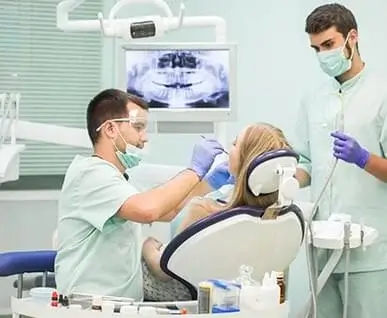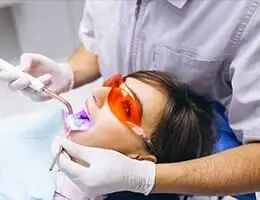8 am to 6 pm (Mon - Fri)
10 am to 8 pm (Sat - Sun)
Root Canals

Root Canal Treatment (RCT)
Root Canal Treatment (RCT) is a dental procedure used to treat infection or damage inside a tooth, particularly in the pulp—the soft tissue containing nerves and blood vessels. The goal of RCT is to remove infection, save the natural tooth, and prevent reinfection. In case if the infected pulp is left untreated, it can lead to severe pain, abscesses, and tooth loss. So, RCT is a way to preserve your natural tooth rather than removing it.
Indications for Root Canal Treatment
Deep decay (cavity) - When decay reaches the pulp chamber
Cracked or broken tooth - Trauma that exposes the pulp
Trauma or injury to the tooth - Physical damage affecting the pulp
Infection or abscess in the tooth pulp - Bacterial infection requiring treatment

Root Canal Procedure in Detail
Anesthesia: The area is numbed to ensure a painless procedure
Pulp Removal: The dentist removes the infected or damaged pulp from inside the tooth
Cleaning & Shaping: The root canals are cleaned, disinfected, and shaped using special instruments
Filling the Canals: The cleaned canals are filled with a biocompatible material called gutta-percha
Sealing & Restoration: The tooth is sealed and usually covered with a crown to restore its shape and strength

Why is RCT Needed?
Saves the natural tooth - Preserves your original tooth structure
Prevents spread of infection - Stops bacteria from spreading to other teeth
Relieves pain and discomfort - Eliminates the source of toothache
Restores normal function and appearance - Allows normal chewing and maintains smile

Does RCT Have Any Side Effects?
Root Canal Treatment (RCT) is generally a safe and effective procedure, but like any medical or dental treatment, it can have some side effects or complications, though they are rare and often manageable. With modern techniques, success rates are over 90–95%.
Additional Information
Recovery Time: Most patients can return to normal activities the same day. Mild discomfort may last for a few days.
Follow-up Care: Regular dental check-ups are important to ensure the treated tooth remains healthy.
Cost-Effective: RCT is often more cost-effective than tooth extraction and replacement with a bridge or implant.
Long-term Success: With proper care, a root canal-treated tooth can last a lifetime.
At Crescent 432, we use advanced technology and techniques to ensure your root canal treatment is comfortable and successful. Our experienced team is dedicated to preserving your natural teeth and maintaining your oral health.



